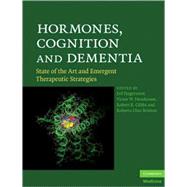
What is included with this book?
| List of contributors | p. vii |
| Preface | p. xi |
| Estrogens and cognition: perspectives and opportunities in the wake of the Women's Health Initiative Memory Study | |
| Women's Health Initiative Memory Study (WHIMS) program: emerging findings | p. 1 |
| Identifying risk factors for cognitive change in the Women's Health Initiative: a neural networks approach | p. 11 |
| Estrogen therapy - relationship to longevity and prevalent dementia in the oldest-old: the Leisure World Cohort Study and the 90+ Study | p. 25 |
| The critical window hypothesis: hormone exposures and cognitive outcomes after menopause | p. 32 |
| Animal studies that support estrogen effects on cognitive performance and the cholinergic basis of the critical period hypothesis | p. 45 |
| The healthy cell bias of estrogen action through regulating glucose metabolism and mitochondrial function: implications for prevention of Alzheimer's disease | p. 55 |
| Varieties of estrogenic therapy | |
| Alternative estrogenic treatment regimens and the Kronos Early Estrogen Prevention Study - Cognitive and Affective substudy (KEEPS-CA) | p. 65 |
| The use of transdermal 17ß-estradiol in the treatment of Alzheimer's disease | p. 80 |
| Alternative modes of treatment: pulsatile estradiol treatment | p. 87 |
| In search of estrogen alternatives for the brain | p. 93 |
| Potential modulators and modifiers of estrogenic effects | |
| Progesterone regulation of neuroprotective estrogen actions | p. 101 |
| Clinical data of estrogen's effects in the central nervous system: estrogen and mood | p. 110 |
| Different forms of soy processing may determine the positive or negative impact on cognitive function of Indonesian elderly | p. 121 |
| Hypothalamus-pituitary-adrenal axis activity in aging women: its impact on the brain and the potential influence of estradiol | p. 133 |
| Possible genetic factors related to hormone treatment effects | |
| Possible genetic polymorphisms related to sex steroid metabolism and dementia in women | p. 143 |
| Genetics related to sex steroids: implications for Alzheimer's disease | p. 153 |
| Apolipoprotein E, hormone therapy, and neuroprotection | p. 162 |
| Testosterone, gonadotropins, and genetic polymorphisms in men with Alzheimer's disease | p. 171 |
| Testosterone, estradiol and men, and sex hormone binding globulin | |
| Androgens and cognitive functioning in women | p. 179 |
| The role of estradiol in testosterone treatment | p. 187 |
| Endogenous testosterone levels and cognitive aging in men | p. 197 |
| Clinical trials and neuroimaging studies of testosterone in men: insights into effects on verbal memory | p. 208 |
| Testosterone therapy and Alzheimer's disease: potential for treatment and prevention in women | p. 220 |
| Endogenous estradiol and dementia in elderly men: the roles of vascular risk, sex hormone binding globulin, and aromatase activity | p. 228 |
| Testosterone regulates Alzheimer's disease pathogenesis | p. 242 |
| Gonadotropin effects | |
| Involvement of gonadotropins in cognitive function: implications for Alzheimer's disease | p. 251 |
| The role of gonadotropins and testosterone in the regulation of beta-amyloid metabolism | p. 259 |
| Epilogue | p. 269 |
| Concluding remarks | p. 271 |
| Index | p. 275 |
| Table of Contents provided by Ingram. All Rights Reserved. |
The New copy of this book will include any supplemental materials advertised. Please check the title of the book to determine if it should include any access cards, study guides, lab manuals, CDs, etc.
The Used, Rental and eBook copies of this book are not guaranteed to include any supplemental materials. Typically, only the book itself is included. This is true even if the title states it includes any access cards, study guides, lab manuals, CDs, etc.